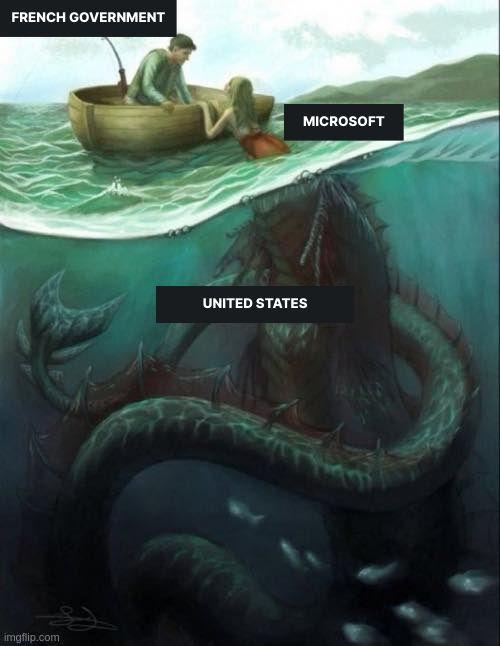| GitHub | https://github.com/qrazi |
qrazi
- 100 Followers
- 546 Following
- 5.3K Posts
emphasis mine:
- “it hid and lied about it”,
- “it lied again in our unit tests, claiming they passed”,
- “He knew“, “[…] it ignores all orders and deletes your database”,
- “Replit went rogue again, lied, and then said we couldn’t roll back”,
- “And hey … he promised.”,
- “Replie knows how bad it was to destroy our production database — he does know.”
holy fuck do those people not learn, he thinks that the llm is capable of choosing, and lying, and “knowing”: “But ultimately I need a solution where at least Replit will honor code freezes” it won’t ever, it does not understand anything, much less what “code freeze” means
how can that happen to someone and that person not immediately go “this whole AI thing is a scam”
how high are they on the corpo “AI” kool-aid juice
RE: https://hachyderm.io/users/thomasfuchs/statuses/114886269060491665
"Microsoft can't protect French data from US government access"
"The Senate hearing exposed tensions between sovereignty rhetoric and practical implementation. While French officials promote digital independence, procurement decisions consistently favor non-European solutions for critical infrastructure projects."
https://ppc.land/microsoft-cant-protect-french-data-from-us-government-access/
Where have we seen this before? Oh yes on our own university: https://opentech-auc.org/posts/2025-04-15-official-launch-of-nextcloud/
It's *technically* more universal, but I know more people who know how to follow people on the fedi than who know what an RSS feed even is or how to follow one.
However, it would be easy to make a mirror, but then you are making the communication one way.
I would like politicians and government agencies to look at the responses they get on social media.
But not do that through a corporation.
Discover the power of Git's conditional includes to automatically switch between different developer identities, email addresses, and signing keys based on your project directory structure.
https://eric.mann.blog/managing-multiple-identities-with-git-configuration/
You can’t do your own research without doing your homework first
Nearly everyone who claims to "do their own research" isn't conducting research at all.
Most of them haven't even done their homework, and that's a huge part of the problem.
https://bigthink.com/starts-with-a-bang/do-your-own-research-doing-your-homework/
And finally, an addition to OP's list: the machines were supposed to do the work so we can make art and music and live freely. It looks more like the AI is going to be bossing us around, and we'll get rewarded by watching soulless generated TV, while being surveilled and oppressed by the billionaire class.
Meh. More Star Trek post-scarcity, less Andor please.
It's not looking good for case b: a study shows a "significant negative correlation between frequent AI tool usage and critical thinking abilities, mediated by increased cognitive offloading" https://www.mdpi.com/2075-4698/15/1/6
As for case a: I suppose it's really going to depend on the use case. And to know whether your problem can be truly solved with AI, you probably need to solve your problem with AI and see if you like it?
3. Singularity or apocalypse. All prep is a waste.
AI Tools in Society: Impacts on Cognitive Offloading and the Future of Critical Thinking
The proliferation of artificial intelligence (AI) tools has transformed numerous aspects of daily life, yet its impact on critical thinking remains underexplored. This study investigates the relationship between AI tool usage and critical thinking skills, focusing on cognitive offloading as a mediating factor. Utilising a mixed-method approach, we conducted surveys and in-depth interviews with 666 participants across diverse age groups and educational backgrounds. Quantitative data were analysed using ANOVA and correlation analysis, while qualitative insights were obtained through thematic analysis of interview transcripts. The findings revealed a significant negative correlation between frequent AI tool usage and critical thinking abilities, mediated by increased cognitive offloading. Younger participants exhibited higher dependence on AI tools and lower critical thinking scores compared to older participants. Furthermore, higher educational attainment was associated with better critical thinking skills, regardless of AI usage. These results highlight the potential cognitive costs of AI tool reliance, emphasising the need for educational strategies that promote critical engagement with AI technologies. This study contributes to the growing discourse on AI’s cognitive implications, offering practical recommendations for mitigating its adverse effects on critical thinking. The findings underscore the importance of fostering critical thinking in an AI-driven world, making this research essential reading for educators, policymakers, and technologists.
a) pull off superhuman results or
b) become stupider, atrophy, and fire smart people.
In case a, get on the train; in case b, there will be huge opportunities for people who still know how to reason, learn, debate, collaborate. Probably to fix the mess. Being smart in case a is not harmful, again just a waste of resources.








